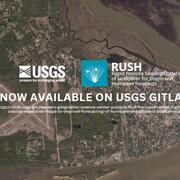A Tool for Rapid-Repeat High-Resolution Coastal Vegetation Maps to Improve Forecasting of Hurricane Impacts and Coastal Resilience
We developed a Jupyter Notebook Application and a Graphical User Interface that use Planet Labs Super Dove 8-band, 3-meter multispectral imagery and a machine learning classification model to deliver high-resolution maps of coastal vegetation showing near real-time conditions. These products will help improve forecasts of hurricane impacts.
Natural coastal vegetated ecosystems provide nature-based solutions to climate-related impacts of hurricanes yet are subject to change each year. Coastal modelers seek simple and fast ways to obtain up-to-date coastal vegetation maps to produce more accurate coastal change forecasts. This project addresses this critical need by leveraging Planet Labs 8-band, 3-m daily satellite images (freely available to Federal employees) and extensive training data. These were combined with a machine learning classification model to develop a rapid repeat, user friendly, Graphical User Interface and Python Jupyter Notebook application that delivers high-resolution maps of coastal vegetation showing near real-time conditions. A User Manual walks individuals at all levels – novice to advanced – through the use of the tool, which helps to build capacity within the USGS remote-sensing community. The project addresses the CDI FY23 theme of climate-related data readiness by making data available for forecasts of hurricane impacts, and that indicate the state of our vegetated ecosystems.
RUSH: Rapid Remote Sensing Updates of landcover for Storm and Hurricane forecasts
RUSH is a tool for rapid repeat high resolution coastal vegetation maps to improve forecasting of hurricane impacts and coastal resilience. Vegetation cover in coastal settings significantly controls flooding, erosion, and barrier island breaching during extreme storms by reducing wave energy. That’s why obtaining up-to-date high resolution coastal vegetation cover is critical for modeling coastal...
RUSH: Rapid Remote Sensing Updates of landcover for Storm and Hurricane forecasts (Version 1.0.0) RUSH: Rapid Remote Sensing Updates of landcover for Storm and Hurricane forecasts (Version 1.0.0)
We developed a Jupyter Notebook Application and a Graphical User Interface that use Planet Labs Super Dove 8-band, 3-meter multispectral imagery and a machine learning classification model to deliver high-resolution maps of coastal vegetation showing near real-time conditions. These products will help improve forecasts of hurricane impacts.
Natural coastal vegetated ecosystems provide nature-based solutions to climate-related impacts of hurricanes yet are subject to change each year. Coastal modelers seek simple and fast ways to obtain up-to-date coastal vegetation maps to produce more accurate coastal change forecasts. This project addresses this critical need by leveraging Planet Labs 8-band, 3-m daily satellite images (freely available to Federal employees) and extensive training data. These were combined with a machine learning classification model to develop a rapid repeat, user friendly, Graphical User Interface and Python Jupyter Notebook application that delivers high-resolution maps of coastal vegetation showing near real-time conditions. A User Manual walks individuals at all levels – novice to advanced – through the use of the tool, which helps to build capacity within the USGS remote-sensing community. The project addresses the CDI FY23 theme of climate-related data readiness by making data available for forecasts of hurricane impacts, and that indicate the state of our vegetated ecosystems.
RUSH: Rapid Remote Sensing Updates of landcover for Storm and Hurricane forecasts
RUSH is a tool for rapid repeat high resolution coastal vegetation maps to improve forecasting of hurricane impacts and coastal resilience. Vegetation cover in coastal settings significantly controls flooding, erosion, and barrier island breaching during extreme storms by reducing wave energy. That’s why obtaining up-to-date high resolution coastal vegetation cover is critical for modeling coastal...


